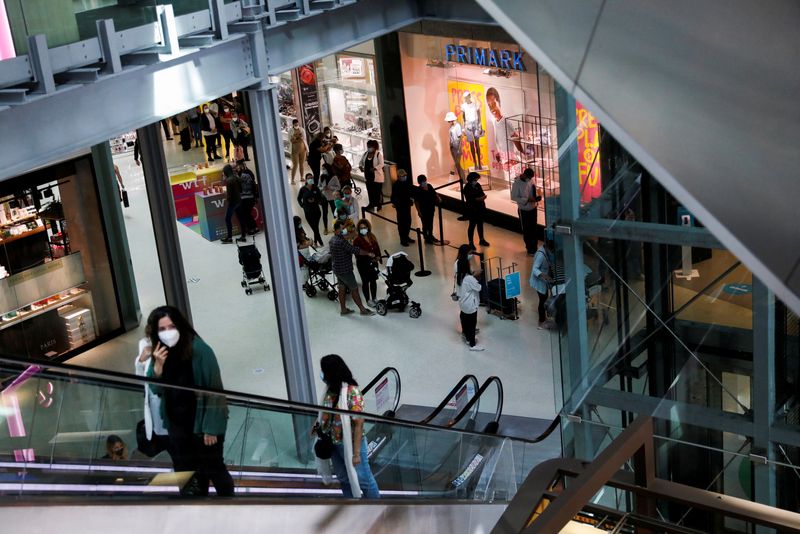Portugal economy grows 6.7% in 2022, but slowing down
2023.02.28 07:48

© Reuters. FILE PHOTO: People are seen in a shopping mall on the first day of the opening of malls after a country lockdown, amid the coronavirus disease (COVID-19) pandemic, in Sintra, Portugal, April 19, 2021. REUTERS/Pedro Nunes
LISBON (Reuters) – Portugal’s economy grew 6.7% in 2022, its strongest pace in 35 years, fuelled by domestic demand and booming tourism, but inflation put the brakes on private consumption in the fourth quarter, presaging a sharp slowdown this year.
In its second reading of gross domestic product released on Tuesday, the National Statistics Institute (INE) revised fourth-quarter growth slightly higher yet kept the annual figure unchanged.
It said the economy grew 0.3% in the last quarter of 2022, up from 0.2% estimated a month ago and the same as in the third quarter. Year-on-year growth reached 3.2%, up from its flash estimate of 3.1%.
However, INE said the contribution of domestic demand to year-on-year GDP was only 1.9 percentage points (pp) after 3.2 pp in the previous quarter, while external demand contributed with 1.1 pp compared to 1.6 pp in the third quarter.
Hit by high inflation, private consumption – which represents two-thirds of GDP – grew just 2.7% between October and December compared to 4.3% in the previous three months.
Quarter-on-quarter, household consumption expenditures decreased by 0.5% despite high inflation, while they had grown by 1.1% in the previous quarter.
Portuguese consumer prices rose 8.2% year-on-year in February in a slowdown from 8.4% reported in the previous month, flash data from INE showed on Tuesday.
Still, core inflation, which strips out volatile food and energy prices, accelerated to 7.2% from 7.0% in January.
The INE said investment fell 1.2% year-on-year in the fourth quarter after a 1.6% increase in the July-September period, while exports growth halved to 8.1% year-on-year from the previous three months’ 16.3% despite the key tourism sector’s recovery to near pre-pandemic levels.
The government projects expansion to slow to just 1.3% in 2023, with private consumption almost stagnating as families struggle with high energy and food prices alongside rising interest rates and slowing exports.








